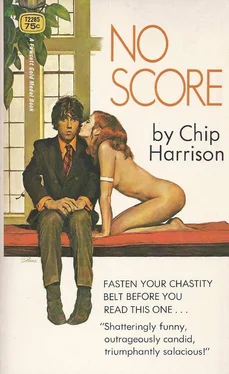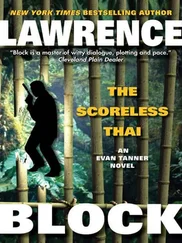Lawrence Block - No Score
Здесь есть возможность читать онлайн «Lawrence Block - No Score» весь текст электронной книги совершенно бесплатно (целиком полную версию без сокращений). В некоторых случаях можно слушать аудио, скачать через торрент в формате fb2 и присутствует краткое содержание. Город: Greenwich, Год выпуска: 1970, ISBN: 1970, Издательство: Fawcett Publications, Жанр: Иронический детектив, Крутой детектив, на английском языке. Описание произведения, (предисловие) а так же отзывы посетителей доступны на портале библиотеки ЛибКат.
- Название:No Score
- Автор:
- Издательство:Fawcett Publications
- Жанр:
- Год:1970
- Город:Greenwich
- ISBN:978-0451187963
- Рейтинг книги:3 / 5. Голосов: 1
-
Избранное:Добавить в избранное
- Отзывы:
-
Ваша оценка:
- 60
- 1
- 2
- 3
- 4
- 5
No Score: краткое содержание, описание и аннотация
Предлагаем к чтению аннотацию, описание, краткое содержание или предисловие (зависит от того, что написал сам автор книги «No Score»). Если вы не нашли необходимую информацию о книге — напишите в комментариях, мы постараемся отыскать её.
No Score — читать онлайн бесплатно полную книгу (весь текст) целиком
Ниже представлен текст книги, разбитый по страницам. Система сохранения места последней прочитанной страницы, позволяет с удобством читать онлайн бесплатно книгу «No Score», без необходимости каждый раз заново искать на чём Вы остановились. Поставьте закладку, и сможете в любой момент перейти на страницу, на которой закончили чтение.
Интервал:
Закладка:
I wasn’t faking a thing. I was really interested at the time. Honestly.
He picked me up in western Pennsylvania, where the school was. We took the Pennsylvania Turnpike west. It turned into the Ohio Turnpike, and we went about halfway through Ohio before he had to turn off. He left me on the pike. I had said I was going to Chicago, and while I didn’t have a great reason to go there, I was stuck with the story.
Before he left me off, he stopped for gas and bought me a meal at the restaurant. He went to the john, and when he got back to the table, he was all excited and took me back to the john to show me all the plumbing fixtures and explain various things about them. We got some very funny looks from the others, let me tell you.
Through Ohio and Indiana and Illinois I talked to a lot of different people and had a total of six more rides. The conversations were something like the one I’d had with the salesman. I won’t bore you with what the various drivers did for a living or where they picked me up and dropped me off, or the makes of the cars and appearance of the drivers. To tell you the truth, I don’t remember it all that clearly. They tend to run together in my mind. Anyway, none of it was that sensational.
I got to Chicago a little before noon. My last driver dropped me north of town near the lake, and I spent almost an hour trying to hitch a ride back toward the center of the city. I suppose it must have been a whole lot less than an hour. In that wind, though, it seemed like forever. Finally a cop car came along and a uniformed cop stuck his head out and said something about hitchhiking. I didn’t catch the words, but it didn’t take an IQ up around the genius level to get the message, which was that hitchhiking was frowned upon. If he hadn’t told me this, I might still be there, frozen solid, with my thumb out.
Now, though, it occurred to me to take a bus, which cost me a quarter and which was the first expenditure I’d had since I left school.
Sitting on that bus, all I could think of was the damned quarter. I mean, after all, I had gone something like twelve hundred miles and eaten three times and all I was out so far was a quarter. You’d think I would be thrilled, for Pete’s sake. But I kept thinking that my $27.46 was now down to $27.21. And that I could afford to take the bus a hundred and eight more times, and then I’d have twenty-one cents left, which would buy me two cups of coffee and a gumball. The point being that I had no money coming in, so any going out was something to worry about.
I kept planning to ask the driver to let me out when we got to the center of town, but I couldn’t think of a way to do this without sounding like a hopeless hick, and for some stupid reason I didn’t want to. So I just kept looking around and waiting. I had been to Chicago before with my parents but couldn’t remember much about it. Except that we went shopping at Marshall Field’s and stayed, I think, at the Palmer House — though when I went to take a look at it, I didn’t notice anything familiar about it. I guess I must have been eight or ten at the time.
Anyway, I recognized the Loop when we first hit it, and when we got to State Street, I remembered that it was the main drag, or else I just recognized it from the song. The street signs have State Street and under it That Great Street. When I noticed this I was tremendously pleased. A point of recognition, as if the street sign was some old school buddy or something. Later, after I had walked all over the damned street, I began to realize how incredibly simple it was of them to put something like that on the dippy street signs. If everybody who goes to Chicago could just see one of those signs once, that would be fine. But to just have them there always, so that even the people who live there have to look at them—
I got off the bus at State Street and started walking around. I mostly stayed right there on That Great Street because it was a nice familiar name and if I left it I was afraid I might never find it again. I walked up and down and looked in store windows at things I didn’t need and couldn’t buy anyway. I kept seeing things that for no reason at all I suddenly wanted. A combination nail clipper and pocket knife, for example, which I needed like the Venus de Milo needs gloves. And although a guy had bought me breakfast just a couple of hours before, I kept getting these dumb yens for food. I couldn’t pass any place that sold anything edible without starting to drool. I stood in front of a restaurant where the cheapest dish on the menu was over four dollars, and I actually stood there reading the whole menu as if I could go in there and dive into a steak. I mean, even if I was fool enough to waste the money, I wasn’t dressed for the place.
Eventually I got annoyed and bought a candy bar just to kill my appetite. They had the nerve to charge six cents for a stinking nickel candy bar.
$27.15.
Two hours later I was stretched out on a bed in a room in the Eagle Hotel ( $3.50 a night), reading the want-ad section of the Chicago Tribune ( free, out of a trash can ). I used a yellow chewed-up pencil stub ( found at the curb ) to mark the ads that looked promising.
There were jobs all over the place. Just looking at those listings, you wouldn’t believe there was anyone in the country who wasn’t working. The only problem was that none of the advertisers wanted to hire a seventeen-year-old kid with three and a half years of high school, no experience whatsoever, and not an awful lot of ability, either.
Not that they seemed to care too much about ability. The main thing seemed to be experience. I would say that ninety-eight ads out of a hundred wanted to hire people with experience, and what they were really hot to hire was someone who was already doing a much more important job at higher pay in the same field. I didn’t blame them, but how could anybody get experience if you had to have it to get a job?
Another thing you had to have was an education. Judging by the ads, if the job was one where you might come up once a week against a two syllable word, they wouldn’t touch you unless you had a college degree, and they wouldn’t be happy about it unless you had a master’s. For less intellectual jobs, like picking ticks off horses, they were willing to settle for you if you had a high school diploma.
It was very goddamned discouraging, let me tell you. I folded the paper and put it down and sat up on the bed — $3.50 a night doesn’t buy you much of a bed, incidentally — and said, aloud, “I’ll bet that fucking truck won’t be there, either.”
This time it didn’t break me up in the slightest. I went back to the paper and kept finding the two percent of the ads that I almost qualified for. Things like passing out handbills on the street, sweeping the floor in a grocery store, jobs that were either temporary or part-time and that didn’t pay all that well anyway.
When I was done, I stretched out on the bed and closed my eyes. The hotel must have been made out of secondhand egg cartons. You could hear absolutely everything, Whenever a toilet flushed anywhere in the building, it was like being next to Niagara Falls. Sometimes I could hear conversations, either two people talking together just low enough so that I could make out every fifth word, or else some drunk shouting at the top of his lungs. I don’t know which was worse.
But lying there I realized what I was going to do.
I was going to Succeed.
Of course you can’t just succeed. You have to succeed at something, and I wasn’t quite sure what that something might be yet. But the impression I got from the men I hitchhiked with was that one job wasn’t all that different from any other. Once you got past the slave level and actually got somewhere in business, the idea was to take something and sell it to someone else. And it didn’t really make very much difference whether the thing you were selling was advertising space or snake oil or industrial bathroom fixtures. The object, whatever it was, was to wind up with more money than you started out with.
Читать дальшеИнтервал:
Закладка:
Похожие книги на «No Score»
Представляем Вашему вниманию похожие книги на «No Score» списком для выбора. Мы отобрали схожую по названию и смыслу литературу в надежде предоставить читателям больше вариантов отыскать новые, интересные, ещё непрочитанные произведения.
Обсуждение, отзывы о книге «No Score» и просто собственные мнения читателей. Оставьте ваши комментарии, напишите, что Вы думаете о произведении, его смысле или главных героях. Укажите что конкретно понравилось, а что нет, и почему Вы так считаете.












